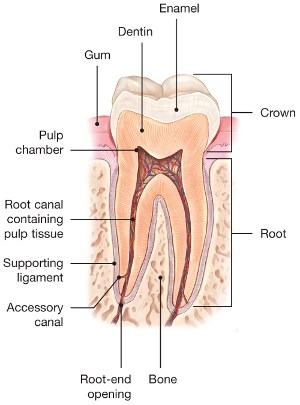Frequently Asked Questions on Root Canal Treatment
Every day, a large number of people deal with the agony of root canals. Some of them go to the doctor and obtain treatment, while others are too afraid to even mention it. Everyone should know that they shouldn't ignore physical suffering. Teeth play an essential role in your everyday life, just like every other component of your body. It facilitates digestion by letting you chew food. Always see a dentist for proper treatment when you experience tooth discomfort. We have addressed a small number of inquiries concerning root canal therapy, one of numerous dental procedures.
Root Canal Treatment Vizag
What is Root Canal Treatment?
When the pulp of a tooth becomes infected or damaged, a dentist may recommend root canal treatment, which is also called endodontic therapy. In the middle of each tooth is the pulp, a soft tissue that houses connective tissue, nerves, and blood vessels. Severe pain, sensitivity to heat or cold, swelling, and other symptoms might accompany pulp infection or inflammation.
The goals of root canal therapy are to extract diseased or injured pulp tissue, disinfect and clean the root canals, and then seal the opening to stop infection in its tracks. Endodontists are dental specialists that specialise in addressing problems with the pulp of the teeth and usually work with general dentists to execute this treatment.
Best Cosmetic Dental near me
How Bad Is the Pain from a Root Canal?
Dentists utilise local anaesthetics to ensure that their patients experience zero discomfort during root canal procedures. The tooth itself is the source of the discomfort that comes with root canal procedures. Relieving the infection really alleviates the pain. No, root canals are not painful.
Who should be the one to do the root canal?
Endodontists do root canals more frequently than general dentists, but all general dentists have received training in the process. While general dentists focus on the outside of teeth and gums, endodontists work on the inside of teeth and gums.
What to expect after getting a root canal?
Some patients report swelling, pain, or sensitivity in the days following a root canal; others report an uneven bite or an adverse response to the endodontist-prescribed medication. It is nearly always necessary to schedule a follow-up appointment, regardless of symptoms.
How risky is a root canal?
When it comes to treating broken or infected teeth, root canal operations are a typical and safe way to keep the tooth's structure intact. The first step in root canal therapy is to extract the diseased or injured pulp from the tooth. Then, the root canals will be cleaned and disinfected. Finally, the area will be sealed to avoid infection.
Why is Root Canal Therapy Beneficial?
They are many bebefits of Root Canal Therapy, like
- Preserves Natural Teeth
- Relieves Pain and Discomfort
- Prevents Spread of Infection
- Improves Oral Health
- Preserves Jawbone Structure
- Cost-Effective
- Efficient and Predictable
What are the signs of a failed Root Canal?
However, there are cases where root canal therapy fails because the procedure did not accomplish the intended result or because complications occurred. The following are examples of symptoms that can suggest a root canal was unsuccessful:
- Persistent Pain
- Swelling or Pus
- Sensitivity to Hot or Cold
- Discoloration
- Loose Crown or Filling
- Bad Taste or Odor
- Radiographic Changes
What if the root canal doesn't work?
Your endodontist may recommend retreatment, extraction with dental implants, or apicoectomy. The majority of root canal failures can be successfully treated with retreatment. Your tooth will be filled and sealed to prevent further damage after your endodontist treats the infection.
At what time does a root canal typically heal?
A few days should be all it takes for a root canal to heal. The discomfort should go away soon. Maintaining healthy teeth throughout time requires consistent daily brushing and flossing in addition to twice-yearly dental checkups.
Is it safe to eat after getting a root canal?
If you're worried about biting your cheek or tongue following a root canal, it's best to wait until the anaesthetic has worn off before eating for 30 to 45 minutes. This will give your temporary filling enough time to set.
What you shouldn't do after getting a root canal?
Until your endodontist or dentist gives you the all-clear, it's best to refrain from biting down too forcefully or chewing on hard foods with the treated tooth. During the first hour, refrain from chewing gum, drinking ice water, or smoking. Furthermore, it is recommended that you refrain from smoking as it can impede the healing process.




